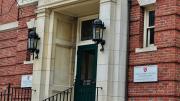Harvard has an addition to its language courses: Elementary Albanian I classes began this semester, housed in the Near Eastern languages and civilizations (NELC) department, which also offers Aramaic, Persian, Turkish, Yiddish, and more.
Edona Cosovic, a second-year government concentrator and the daughter of Albanian immigrants from eastern Montenegro, was one of the students who pushed to introduce the language. Growing up in the United States, she learned to speak Albanian informally at home, but found that it was difficult to keep up the language, despite a strong desire to do so. “When I was a kid my parents didn’t have the resources to get us Albanian TV,” she says. “We’re in school all day, we listen to American TV, everything’s in English, and they are also trying to learn English because they’re working here, and they’re also trying to make money, so we lose the language very, very quickly, within one generation.”
In March 2022, Cosovic inquired about the possibility of building a course at Harvard. She spoke to Eva Stathi Misho, a NELC student coordinator who was eager to help. Before coming to the United States to study classics at Hellenic College in Brookline, Stathi Misho studied Albanian language and literature in Tirana, the country’s capital. She often gets asked what language is spoken in Albania. The course, she believes, will make the answer to that question a little less obscure. It shows that “we exist [and] we have a language,” she says. She is teaching her sons Albanian by reading and speaking to them in her native tongue.
Harvard is now the only Ivy League university to offer Albanian. Still, the language has a long instructional legacy in the United States. Prompted by early waves of Albanian immigrants, Columbia taught it intermittently from 1932 until the 1960s. Widely considered among the most difficult langauges to learn, Albanian is only taught at a select few American institutions, including Arizona State University, DePaul University, and Mercy College in Dobbs Ferry, New York.
Standardized in 1972, Albanian has two principal, mutually intelligible dialects—the northern Gheg and the southern Tosk—as well as several other subdialects and variants. The language constitutes its own single branch of the family of Indo-European languages and has a complex grammar with five cases and six moods, including the unusual admirative mood used to express astonishment or surprise. Apart from being the official langauge of Albania and the majority official language of Kosovo, it is spoken by minority communities in other Balkan countries, including North Macedonia, Montenegro, Croatia, Serbia, and Bulgaria, as well as in Greece, Italy, and Turkey.
Faton Limani, department administrator in the Comparative Literature department, collaborated with Stathi Misho to find a home for the course. When the pandemic began, he and his wife founded an online Albanian program for children without access to language instruction. Now he teaches Albanian to Harvard students in the new course. The course is meant to ensure that anyone who wants to learn Albanian will have the opportunity, he says.
Under agreements between Harvard’s Faculty of Arts and Sciences and other universities, students from Brown, Tufts and MIT are eligible to cross-register for this course. The hope, however, is to expand the program to include intermediate and advanced Albanian. With a full course offering, students who are interested in testing out of the foreign language requirement with Albanian could do so at Harvard, without the need for an external examiner.
Nader Uthman, director of NELC’s modern languages program, has supported the initiative to introduce Albanian, citing student demand. “We often find that our students’ interests in LCTLs [less-commonly taught languages] have to do with their academic interests, curiosity about diverse cultures, or their heritage,” he said via email. “Affording our students such opportunities better enables them to become global citizens by expanding their cultural proficiency, their ability to undertake independent research, [and to] pursue a wider variety of career options.”
Institutional support for rare, minor, and less commonly taught languages tends to be harder to come by. There are more than six million Albanian speakers in southeast Europe alone, and a large diaspora scattered across the globe, including 200,000 people in the United States. For younger families and first- and second-generation Albanian Americans, access to language education is especially important. Building and maintaining proficiency in heritage languages is already a challenge, especially when resources and institutional support are lacking.
The prospect of NELC hosting an Albanian course had crossed Stathi Misho’s mind on her first day as student coordinator, long before Cosovic made the formal inquiry. “As an Albanian, it makes me really happy to see Albanian on the course catalogue,” she says. “It’s a dream come true.”
For Cosovic, preserving the connection to her heritage is important, and one day, she would like her children to speak Albanian. Along with helping her to build confidence in the language and bridging the gap between her family’s dialect and the standard form of the language, the course is preparing her for an internship abroad. This summer she will work with the Albanian prime minister and pursue research on economic and international development in Albania.
Besides serving children of the diaspora, the aim is that Albanian courses will appeal more broadly to undergraduates looking to fulfill their foreign language requirements, and that other schools will eventually follow Harvard’s example.









